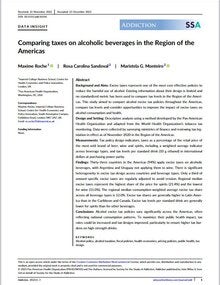Abstract
Background and Aims
Excise taxes represent one of the most cost-effective policies to reduce the harmful use of alcohol. Existing information about their design is limited and no standardized metric has been used to compare tax levels in the Region of the Americas. This study aimed to compare alcohol excise tax policies throughout the Americas, compare tax levels and consider opportunities to improve the impact of excise taxes on alcohol consumption and health.
Design and Setting
Descriptive analysis using a method developed by the Pan American Health Organization and adapted from the World Health Organization's tobacco tax monitoring. Data were collected by surveying ministries of finance and reviewing tax legislation in effect as of November 2020 in the Region of the Americas.
Measurements
Tax policy design indicators, taxes as a percentage of the retail price of the most-sold brand of beer, wine and spirits, including a weighted average indicator across beverage types, and tax levels per standard drink (10 g ethanol) in international dollars at purchasing power parity.
Findings
Thirty-three countries in the Americas (94%) apply excise taxes on alcoholic beverages, with Argentina and Uruguay not applying them to wine. There is significant heterogeneity in excise tax design across countries and beverage types. Only a third of amount-specific excise taxes are regularly adjusted to avoid erosion. Regional median excise taxes represent the highest share of the price for spirits (21.4%) and the lowest for wine (11.0%). The regional median consumption-weighted average excise tax share across all beverage types is 12.0%. Excise tax shares are generally higher in Latin America than in the Caribbean and Canada. Excise tax levels per standard drink are generally lower for spirits than for other beverages.
Conclusions
Alcohol excise tax policies vary significantly across the Americas, often reflecting national consumption patterns. To maximize their public health impact, tax rates could be increased and tax designs improved, particularly to ensure higher tax burdens on high-strength drinks.
|

